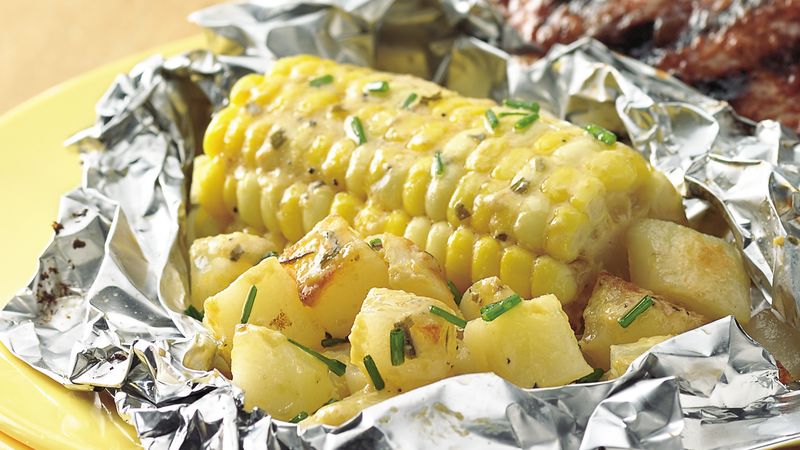Good Mood Foods
“Your diet ultimately has an impact on how you feel,” says Mary Beth Augustine, R.D., a dietitian at the Continuum Center for Health & Healing in New York City. Banish three unsavory moods by eating the right foods.

Mood: Stressed Out or Tense
You’re running late for an important meeting; you’re working on a tight deadline; you’re waiting for medical results from a serious test. No matter the scenario, strained situations can produce similar physiological reactions in your body. “Your blood pressure rises, your heart rate in-creases and your body makes glucose to give you the energy you need to get through,” says Augustine. There’s also a rise in cortisol, a hormone that, when released over time, can lead to heart disease, diabetes and obesity.
Foods to reach for: Complex carbo-hydrates, such as legumes, whole-grain breads and cereals, and starchy vegetables, such as potatoes and corn .
Why it works: “Carbohydrates destress you by increasing the production of serotonin,” says Dr. Wurtman. This key chemical in your brain improves mood, increases emotional energy and relieves pain.
Keep in mind: Simple carbohydrates that are refined or processed, such as doughnuts and cookies, up serotonin production faster than complex carbohydrates by quickly releasing glucose, which further increases the brain’s ability to produce serotonin. But by choosing a jelly doughnut over a whole-wheat pita pocket you’ll pay a hefty price in weight gain and compromised healthy eating goals. In addition, for serotonin to tranquilize, carbs need to be eaten on an empty stomach and, surprisingly, without protein.
By the way…If you experience irritability brought on by premenstrual syndrome (PMS), then you have all the more reason to consume complex carbohydrates. Dr. Wurtman advises eating a baked potato or a carbohydrate-based beverage that decreases anxiety.
Mood: Tired or Sluggish
When energy levels plummet, most people reach for a quick fix. Caffeinated drinks—coffee, tea or soda—will perk you up, but too much will make you jittery and may cause insomnia. Sugar is another quick source of energy. Eat a candy bar or a piece of cake when you’re feeling tired and it isn’t long before you feel energized. The end result of a sugar high, however, is a crash.
Foods to reach for: Carbs, like plums, oranges, apples, pears, dried apricots, grapefruit, cherries and whole-grain breads, paired with protein-rich foods, such as shrimp, chicken, eggs, nuts or pork.
Why it works: “When combined, carbohydrates and protein release energy-giving glucose and tyrosine, an amino acid that produces norepinephrine and dopamine, brain chemicals re-sponsible for alertness, excitement, action and mental acuity,” says Hyla Cass, M.D., assistant clinical professor of psychiatry at UCLA’s School of Medicine and coauthor of Natural Highs.
Keep in mind: It’s important to pay attention not only to what you eat, but to when. Foods consumed in the morning set energy levels for the rest of the day. Therefore, breakfast has the ability to make or break you. “People who skip it are much more likely to battle fatigue, memory lapses and food cravings later in the day,” says Elizabeth Somer, R.D., author of Food & Mood. To start the day right, opt for an egg to go along with your English muffin rather than a thick, fattening spread of cream cheese. Somer adds that if you do skip breakfast, there’s really nothing you can do to regain the energy you would’ve had if you’d eaten something in the morning. “All you can do is grit your teeth, get through the day and start over tomorrow,” she says.
By the way…Energy will also lag if you’re iron-deficient. To increase levels, add iron-rich foods, like spinach or kale, and lean meats to your diet.
Mood: Depressed or Unmotivated
People who suffer from depression have lower levels of serotonin, which can make them feel sad, empty and uninterested in life. Antidepressants such as Prozac and Zoloft work by regulating this imbalance and leveling moods. Although no food will take away clinical depression, there are dietary changes you can make to beat occasional blues. If symptoms of depression last longer than two weeks, however, see your doctor.
Foods to reach: for Carbohydrates, such as nuts, skim milk, plums, oranges, apples, pears, dried apricots, grapefruit, peanuts and whole grains, along with omega-3 fatty acids found in sardines, anchovies, salmon, herring or mackerel as well as in pumpkin and sunflower seeds.
Why it works: The carbs that increase energy levels are the same ones that increase serotonin levels. Foods that contain omega-3 fatty acids, which your body cannot produce on its own, also support serotonin activity.
Keep in mind: Food allergies may cause or worsen low moods. “Some foods, such as dairy, wheat and eggs, can trigger asthma, migraines and acid reflux,” says Augustine. “So chances are that others can cause different effects.” Try eliminating certain foods from your diet. “You’d be surprised to learn that one thing you eat regularly may be causing fatigue or the blahs,” she says.
By the way…Once you attain a buoyant mood, keep it going by avoiding high-fat foods and alcohol, which can bring you down. Let the atmosphere of a party keep you happy, not the hors d’oeuvres and cocktails.


